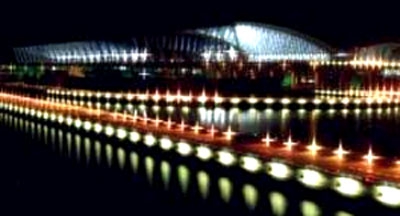Jan , 2004
返台

撰文/ 黃懷德
或許是我認為的設計事業的經營方式太與環境格格不入,而有過於天真浪漫之嫌,看著朋友們忙碌無不的生活及經營狀況,理應為他們感到高興,祝福朋友們在內地找到了新的舞台。
因為業務需要,前往既熟悉又顯得陌生的上海。
以往執行內地的設計案,大概都是在台北,委任當地的設計院執行後續的管理,利用網際網路作設計品質的控管及溝通,這次親身前往,除了驗證一些流傳於業界的內地經驗外,多少還有些渡假的性質。
除了晚上在飯店內和台北公司傳遞訊息外,其他時間都在東跑西跑,驗收工程、和幾個跑去上海發展的同行敘舊、接洽新的設計業務,及感受當地的溫度、文化。
就都市印象來說,上海幾個重點發展區域已經超越了台北,共產國家的威權效率還是有值得誇獎的部分,至少不會像我們一樣,在故宮博物院正對面蓋個豪宅那般離譜,街道的規劃和視覺整理,我只能說,那是我們做不到的,民主自由背後總有他的包袱,無所謂對錯,但就人民的基本素養來說,當地人要搭的上環境條件還是有一段必須學習成長距離,我想這一點,只要是去過那的,大概都會同意我的說法吧,我覺得很可惜的,也大概就是這個部分了。
和幾個去內地發展的朋友敘舊,感觸頗深,台北市場的萎縮,讓他們不得不將自己賣給工作,失去了生活品質,不管是經營者或是去上班的,都覺得台北好,但是卻有諸多不得已,也有少數人覺得去那發展才是所謂的人上人,比較起來,相對他們來說,我幸福多了,台北的設計業務量讓我挪不出時間思考兩岸市場的發展可能性,內地的設計案業務判斷的標準對我而言,在設計上必須要有挑戰性及趣味,才會考慮到是否有承接必要的問題,當你賣的是專業,而不單純只是時間及生命,在任何市場絕對有生存及發展的空間。
設計事業之所以無法像其他行業獲利那般可觀,一個很重要的原因,乃是設計事業首重質的優劣,而非單就追求量的提昇,設計最辛苦的就是質的昇華,因為內地正處於高速發展的階段,設計需求自然比台北要大,在內地成立公司,一樣的資本在當地營造大公司的場面輕而易舉,但持平來說,不過就是台北的放大,對質的提昇並沒有什麼幫助,反而因為量的需要而倒退妥協,這也無所謂對錯,端看設計事業經營的主軸為何,但把時間拉長來看,當使用者眼界廣了,對質的需求提昇了,現階段的優勢是否還是優勢,是否輕而易舉的就被當地人取而代之,反而失去了質的競爭力,這實在是經營者追求量的同時,不得不仔細思考的問題。
因為設計品質不僅和潮流脈動有關,還和平日累積有直接的連帶關係,不是隨時想給就可以從腦袋掏出來的,否則就得找現成的人才為你賣命,這個時候就要看公司的作業環境和整體條件,來決定你找到的是不是人才了。
或許是我認為的設計事業的經營方式太與環境格格不入,而有過於天真浪漫之嫌,看著朋友們忙碌無不的生活及經營狀況,理應為他們感到高興,祝福朋友們在內地找到了新的舞台,然而在這同時,不免心生憐惜和幾許的感傷,回到熟悉忙碌的台北。
返台

撰文/ 黃懷德
或許是我認為的設計事業的經營方式太與環境格格不入,而有過於天真浪漫之嫌,看著朋友們忙碌無不的生活及經營狀況,理應為他們感到高興,祝福朋友們在內地找到了新的舞台。
因為業務需要,前往既熟悉又顯得陌生的上海。
以往執行內地的設計案,大概都是在台北,委任當地的設計院執行後續的管理,利用網際網路作設計品質的控管及溝通,這次親身前往,除了驗證一些流傳於業界的內地經驗外,多少還有些渡假的性質。
除了晚上在飯店內和台北公司傳遞訊息外,其他時間都在東跑西跑,驗收工程、和幾個跑去上海發展的同行敘舊、接洽新的設計業務,及感受當地的溫度、文化。
就都市印象來說,上海幾個重點發展區域已經超越了台北,共產國家的威權效率還是有值得誇獎的部分,至少不會像我們一樣,在故宮博物院正對面蓋個豪宅那般離譜,街道的規劃和視覺整理,我只能說,那是我們做不到的,民主自由背後總有他的包袱,無所謂對錯,但就人民的基本素養來說,當地人要搭的上環境條件還是有一段必須學習成長距離,我想這一點,只要是去過那的,大概都會同意我的說法吧,我覺得很可惜的,也大概就是這個部分了。
和幾個去內地發展的朋友敘舊,感觸頗深,台北市場的萎縮,讓他們不得不將自己賣給工作,失去了生活品質,不管是經營者或是去上班的,都覺得台北好,但是卻有諸多不得已,也有少數人覺得去那發展才是所謂的人上人,比較起來,相對他們來說,我幸福多了,台北的設計業務量讓我挪不出時間思考兩岸市場的發展可能性,內地的設計案業務判斷的標準對我而言,在設計上必須要有挑戰性及趣味,才會考慮到是否有承接必要的問題,當你賣的是專業,而不單純只是時間及生命,在任何市場絕對有生存及發展的空間。
設計事業之所以無法像其他行業獲利那般可觀,一個很重要的原因,乃是設計事業首重質的優劣,而非單就追求量的提昇,設計最辛苦的就是質的昇華,因為內地正處於高速發展的階段,設計需求自然比台北要大,在內地成立公司,一樣的資本在當地營造大公司的場面輕而易舉,但持平來說,不過就是台北的放大,對質的提昇並沒有什麼幫助,反而因為量的需要而倒退妥協,這也無所謂對錯,端看設計事業經營的主軸為何,但把時間拉長來看,當使用者眼界廣了,對質的需求提昇了,現階段的優勢是否還是優勢,是否輕而易舉的就被當地人取而代之,反而失去了質的競爭力,這實在是經營者追求量的同時,不得不仔細思考的問題。
因為設計品質不僅和潮流脈動有關,還和平日累積有直接的連帶關係,不是隨時想給就可以從腦袋掏出來的,否則就得找現成的人才為你賣命,這個時候就要看公司的作業環境和整體條件,來決定你找到的是不是人才了。
或許是我認為的設計事業的經營方式太與環境格格不入,而有過於天真浪漫之嫌,看著朋友們忙碌無不的生活及經營狀況,理應為他們感到高興,祝福朋友們在內地找到了新的舞台,然而在這同時,不免心生憐惜和幾許的感傷,回到熟悉忙碌的台北。
Returning to Taiwan
by Roy Huang
Perhaps I am out of tune with the regular management style for a designing career, and sometimes regarded as impractical. However, when I see my friends’ busy life and operation status on the Mainland, I should be happy for them. I wish them the best on the Mainland.
Due to business needs, I went to Shanghai, a place that is both familiar and strange for me.
I usually deal with cases from the Mainland in Taipei, and appoint a local office there to finish the follow-up management. Through the Internet, I communicate with them and control the quality of design. This time, I went there personally to not only prove some rumors about the realm of design on the Mainland, but also to go on vacation.
I was traveling around the city, checking construction, chatting with some fellow designers who started their career there, handling new assignment, and experiencing the local temperature and culture besides communicating with the Taipei office in the evenings at the hotel.
In terms of city images, some of the key-point development zones in Shanghai have surpassed Taipei. I would have to say that Communist’s national power, prestige, and efficiency are amazing. At least, you will never see modern luxury buildings right across from the Palace Museum like here in Taiwan. Their street planning and visual design are something we cannot compete with right now. There is always baggage behind democracy, and it is not about right or wrong. However, the basic civic sense is something that the local mainlanders have to learn and try to catch up. I think people who have been there will agree with me. And, that might be the only thing I felt bad for them.
When I was chatting with my friends there, I had a strong feeling. Due to the shrinking of the Taipei market, they had to devote themselves to their work and lost their quality of life. Among those who own businesses or work there, they all preferred to stay in Taipei, but they did not have a choice, but there are still a few people that preferred to move their offices to the Mainland. Compared to them, I think I am pretty lucky. Too many business affairs in Taipei make me occupied all the time, so that I don’t have time to consider working there might be a possibility. For me, the standard for me to accept business in the Mainland is that it must be challenging and interesting; otherwise I may not take it. I think you can survive and develop anywhere if your advantage is “professional,” not just time and energy.
The designing industry doesn’t earn as much profit as others because we focus on “quality,” not “quantity.” Thus, a designer really has to work hard to improve his quality. On the Mainland, all businesses are developing rapidly, so the demands of designing is more urgent than that of Taipei. You can easily establish a huge company with low capital on the Mainland; however, the situation is like an enlarged version of Taipei. It is not helpful at all to improve the quality of work, but compromise for “quantity.” It is not about right or wrong, but it all depends on what the owner’s management target is. After a few years, customers may have a better vision and start asking for better quality. Then, if our current advantage still remains will it be easily replaced by the locals and lose our competitiveness? This is what the owners should consider when they pursue quantity only. The quality of design is not only in connection with the trend but also what information you’re receiving and accumulating everyday. Thus, designing is not something in your brain that you can retrieve at any time. Even if you find a talented designer, whether he can do a good job relies on what the office can offer.
Perhaps I am out of tune with the regular management style for a designing career, and sometimes regarded as impractical. However, when I see my friends’ busy life and operation status on the Mainland, I should be happy for them but I also feel sympathetic and a little sad while returning to the familiar and busy Taipei.


